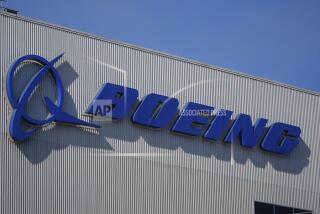Struggling McDonnell Douglas Sets Layoffs : Jobs: With orders off and new jets postponed, up to 3,000 workers will be furloughed, mostly at the company’s aircraft unit in Long Beach.
- Share via
McDonnell Douglas, reeling from a sharp drop in aircraft orders and a postponement of its new MD-12 jetliner, said Monday that it will lay off 1,000 to 3,000 workers in the next month, mostly in Long Beach.
The latest cutbacks come amid increasing questions about the long-term viability of the firm’s Douglas Aircraft unit in Long Beach, which has already reduced total employment from 45,000 two years ago to 30,500 now.
In announcing the latest cutbacks, McDonnell officials cited the “deep slump” that has affected the company. An undisclosed portion of the layoffs were triggered by delays in developing McDonnell’s big MD-12 airliner, which was to be the centerpiece of its commercial aircraft strategy.
The postponement came after three of Douglas Aircraft’s major domestic and international airline customers rejected its MD-12 design, meaning that engineers may have to go to the drawing board for the third time.
But instead of maintaining the MD-12 engineering effort at full speed, the firm is apparently slowing the program significantly. The labor cutbacks will mean the MD-12 will not be ready for development until next year at the earliest, according to Paul Nisbet, an analyst at Prudential Securities.
In meetings held several weeks ago, Delta Airlines, Swiss Air and Singapore Airlines told the firm that its MD-12 double-decker design, which would carry more than 500 passengers, was simply too big, and the airlines did not want to see Douglas attempting to compete directly with Boeing on the aircraft, according to aircraft industry sources.
“It was sort of stupid to compete with the 747,” one airline industry executive said. “Boeing would eat their lunch. Boeing could cut prices or reconfigure the plane easily to counter the MD-12. McDonnell Douglas made a major strategic error.”
McDonnell had already redesigned the MD-12 earlier this year after failing to win orders for a version derived from its MD-11 three-engine jet. The airlines rejected that design because it failed to provide an adequate increase in efficiency over existing aircraft.
The MD-12 program has also been hurt by delays and backpedaling by Taiwan Aerospace, which had agreed last November to acquire up to 40% of Douglas Aircraft’s commercial business for $2 billion. The deal was repeatedly delayed and hurt McDonnell’s ability to market the MD-12.
The failure to move the MD-12 forward is compounded by a precipitous decline in orders for existing aircraft. McDonnell has suffered a net decline of 35 aircraft orders during the last 15 months, while Boeing has booked an additional 313 orders and Airbus Industries as many as 110 orders.
McDonnell will cut back production of MD-80 jetliners to just 45 aircraft next year from perhaps 90 this year and 140 last year, Nisbet projected. MD-11 production would stay at about 35 to 40 aircraft.
The precipitous decline in its ability to sell existing planes, coupled with its failure to advance the MD-12, has left many airline industry officials and analysts gloomy about the firm’s prospects.
John Harbison, chief of Booz Allen & Hamilton’s aerospace practice, said that cutbacks in the short term will boost profits, but at the expense of McDonnell’s long-term viability.
“It is hard to imagine that, over the long run, the company can continue to be viable without making these kinds of investments,” Harbison said.
Peter Aseritis, First Boston’s aerospace analyst, said: “There is a good chance that the Douglas Aircraft Co. will go out of business in the next few years. How the hell are they going to stay in business when nobody has ordered their airplanes?”
Investors drove McDonnell shares down $1.50 Monday to a new 1992 low of $38.
Nonetheless, Nisbet and some other experts remain far less concerned about Douglas Aircraft.
“There is a strong element of people saying this is a house of cards that is going to come down around management and that the company is going to go away,” Nisbet said. “That is not likely.”
Nisbet said that despite the dearth of new orders, the firm can continue to earn good profits for at least two years off its existing backlog.
More to Read
Inside the business of entertainment
The Wide Shot brings you news, analysis and insights on everything from streaming wars to production — and what it all means for the future.
You may occasionally receive promotional content from the Los Angeles Times.











